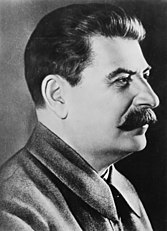একচ্ছত্রবাদ: সংশোধিত সংস্করণের মধ্যে পার্থক্য
শুরু |
(কোনও পার্থক্য নেই)
|
১৩:২৯, ১ সেপ্টেম্বর ২০২২ তারিখে সংশোধিত সংস্করণ
একচ্ছত্রবাদ বলতে এমন এক ধরনের সরকারের রূপ ও রাষ্ট্রব্যবস্থাকে বোঝায়, যাতে সমস্ত বিরোধী দলকে নিষিদ্ধ করে দেওয়া হয়, রাষ্ট্র ও তার দাবীর বিরুদ্ধে সমস্ত ব্যক্তিগত ও দলগত বিরোধিতা বেআইনি করে দেওয়া হয় এবং নাগরিকদের জনজীবন ও ব্যক্তিগত জীবনের উপর অত্যন্ত উচ্চ মাত্রায় নিয়ন্ত্রণ ও প্রবিধান প্রয়োগ করা হয়। এটিকে কর্তৃত্ববাদের চরম ও সবচেয়ে সম্পূর্ণ রূপ হিসেবে গণ্য করা হয়। একচ্ছত্রবাদী রাষ্ট্রগুলিতে রাজনৈতিক ক্ষমতা প্রায়শই স্বেচ্ছাচারী শাসক যেমন স্বৈরশাসক বা পরম রাজপ্রধানদের হাতে কুক্ষিগত থাকে, যারা রাষ্ট্র-নিয়ন্ত্রিত গণমাধ্যমের সাহায্যে সর্বব্যাপী উদ্দেশ্যপ্রণোদিত প্রচারণা অভিযান চালনা করেন যার উদ্দেশ্য নাগরিকদের নিয়ন্ত্রণ করা।[১] The concept gained prominent influence in Western political discourse during the Cold War.[২][৩][৪][৫][৬]
রাজনৈতিক ভাবাদর্শ হিসেবে একচ্ছত্রবাদ পরিস্কারভাবেই একটি আধুনিক ঘটনা, তবে এর ঐতিহাসিক উৎসগুলি জটিল প্রকৃতির। দার্শনিক কার্ল পপার প্রাচীন গ্রিক দার্শনিক প্লেটো (প্লাতোস), গেয়র্গ ভিলহেল্ম ফ্রিডরিখ হেগেলের রাষ্ট্র বিষয়ক ধারণা ও কার্ল মার্ক্সের রাজনৈতিক দর্শনে এর শেকড়ের সন্ধান পেয়েছেন।[৭] তবে পপারের একচ্ছত্রবাদ বিষয়ক ধারণাগুলি উচ্চশিক্ষায়তনে সমালোচিত হয়েছে এবং এখনও অতি-বিতর্কিত রয়ে গেছে।[৮][৯] অন্যান্য দার্শনিক ও ইতিহাসবিদ যেমন টেওডোড় আডোর্নো ও মাক্স হর্কহাইমার একচ্ছত্রবাদী মতবাদগুলির উৎস খুঁজে পান আলোকময়তার যুগের মধ্যে, বিশেষ করে নরকেন্দ্রিক এই ধারণাটি যা অনুযায়ী "মানুষ এখন বিশ্বের কর্তা, যে কর্তা আর প্রকৃতি, সমাজ ও ইতিহাসের সাথে তার সংযোগ দ্বারা সীমাবদ্ধ নয়।"[১০] ২০শ শতকে এসে পরম রাষ্ট্রীয় ক্ষমতার ধারণাটি প্রথমে ইতালীয় ফাশিবাদীরা প্রথম সৃষ্টি করে, এবং প্রায় একই সময়ে জার্মানির নাৎসি দলের এক আইনবিদ ও উচ্চশিক্ষায়তনিক ব্যক্তিত্ব কার্ল শ্মিট ভাইমার প্রজাতন্ত্রের সময় ১৯২০-এর দশকে এর উন্নয়ন ঘটান।
তথ্যসূত্র
- ↑ Conquest, Robert (১৯৯৯)। Reflections on a Ravaged Century। পৃষ্ঠা 74। আইএসবিএন 0393048187।
- ↑ উদ্ধৃতি ত্রুটি:
<ref>ট্যাগ বৈধ নয়;siegelনামের সূত্রটির জন্য কোন লেখা প্রদান করা হয়নি - ↑ উদ্ধৃতি ত্রুটি:
<ref>ট্যাগ বৈধ নয়;guilhotনামের সূত্রটির জন্য কোন লেখা প্রদান করা হয়নি - ↑ উদ্ধৃতি ত্রুটি:
<ref>ট্যাগ বৈধ নয়;reischনামের সূত্রটির জন্য কোন লেখা প্রদান করা হয়নি - ↑ উদ্ধৃতি ত্রুটি:
<ref>ট্যাগ বৈধ নয়;deftyনামের সূত্রটির জন্য কোন লেখা প্রদান করা হয়নি - ↑ উদ্ধৃতি ত্রুটি:
<ref>ট্যাগ বৈধ নয়;cauteনামের সূত্রটির জন্য কোন লেখা প্রদান করা হয়নি - ↑ Popper, Karl (২০১৩)। Gombrich, E. H., সম্পাদক। The Open Society and Its Enemies। Princeton University Press। আইএসবিএন 978-0691158136। ১১ জানুয়ারি ২০২২ তারিখে মূল থেকে আর্কাইভ করা। সংগ্রহের তারিখ ১৭ আগস্ট ২০২১।
- ↑ Wild, John (1964). Plato's Modern Enemies and the Theory of Natural Law. Chicago: University of Chicago Press. p. 23. "Popper is committing a serious historical error in attributing the organic theory of the state to Plato and accusing him of all the fallacies of post-Hegelian and Marxist historicism—the theory that history is controlled by the inexorable laws governing the behaviour of superindividual social entities of which human beings and their free choices are merely subordinate manifestations."
- ↑ Levinson, Ronald B. (1970). In Defense of Plato. New York: Russell and Russell. p. 20. "In spite of the high rating one must accord his initial intention of fairness, his hatred for the enemies of the 'open society,' his zeal to destroy whatever seems to him destructive of the welfare of mankind, has led him into the extensive use of what may be called terminological counterpropaganda. ... With a few exceptions in Popper's favour, however, it is noticeable that reviewers possessed of special competence in particular fields—and here Lindsay is again to be included—have objected to Popper's conclusions in those very fields. ... Social scientists and social philosophers have deplored his radical denial of historical causation, together with his espousal of Hayek's systematic distrust of larger programs of social reform; historical students of philosophy have protested his violent polemical handling of Plato, Aristotle, and particularly Hegel; ethicists have found contradictions in the ethical theory ('critical dualism') upon which his polemic is largely based."
- ↑ Horkheimer, Max; Adorno, Theodor W.; Noeri, Gunzelin (২০০২)। Dialectic of Enlightenment (ইংরেজি ভাষায়)। Stanford University Press। আইএসবিএন 978-0804736336। ২০২২-০১-১০ তারিখে মূল থেকে আর্কাইভ করা। সংগ্রহের তারিখ ২০২১-০৮-১৭।


